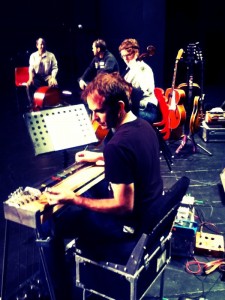 If you’ve been hanging around here for a while, you know that I’m a fan of the intersection of literature and music. I think the resulting art is often enhanced by the exposure of musicians to books, or writers to music – or writers to musicians, for that matter. Stellarondo (whom I’ve covered here before a time or two) is embarking on an ambitious project, collaborating directly with writer Rick Bass on an album of “scored stories.” There is, as there so often is, a Kickstarter campaign. Of course there are a lot of excellent and worthy Kickstarter campaigns out there, and I’m not going to talk about all (or even most) of them on this blog.
If you’ve been hanging around here for a while, you know that I’m a fan of the intersection of literature and music. I think the resulting art is often enhanced by the exposure of musicians to books, or writers to music – or writers to musicians, for that matter. Stellarondo (whom I’ve covered here before a time or two) is embarking on an ambitious project, collaborating directly with writer Rick Bass on an album of “scored stories.” There is, as there so often is, a Kickstarter campaign. Of course there are a lot of excellent and worthy Kickstarter campaigns out there, and I’m not going to talk about all (or even most) of them on this blog.
But Stellarondo has a bit of an ace up their sleeve in that they have a very talented writer on hand to tell you why you should donate it. I got this via e-mail this morning and thought it was absolutely worth the (longish) read – I love reading about non-musicians getting a glimpse into this weird little world of ours – so I’m just going to hand the mic over to Mr. Bass:
The tour is over, and I learned some things about musicians. I had thought they might be kind of like writers, in their habitual poverty, but I found out it’s much worse. As a writer you can’t get much more broke than broke: you write a story, a novel, or a lifetime of novels, or what-have-you, and either they sell or they don’t. Worst case, you’re out that investment of your time—call it a lifetime—and a few liters of ink, and some paper.
But to play music is to travel down into a pit of debt. Often—and I had heard that this was the case—the more you play, the poorer you can get, on the road. In this regard, the beauty generated by music carries quite a different price than that generated by literature. The smaller yet necessary venues in which off-the-top expenses for venue rental, sound engineer, lighting engineer, gas, van-wear, food, and drink lay waste to whatever number of folks wander in that night to listen to live music, and to living stories, and to this curious and unique thing we are giving breath to that combines the two in such a way as to make a whole that is greater than the parts. And then to divide that negative number then by five has the curious effect of making that debt smaller. It’s a curious paradigm.
There’s much more; go read it, and throw a few bucks in Stellarondo’s hat if you feel so inclined.
